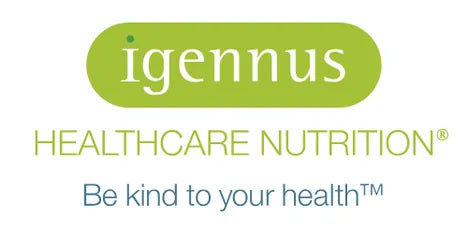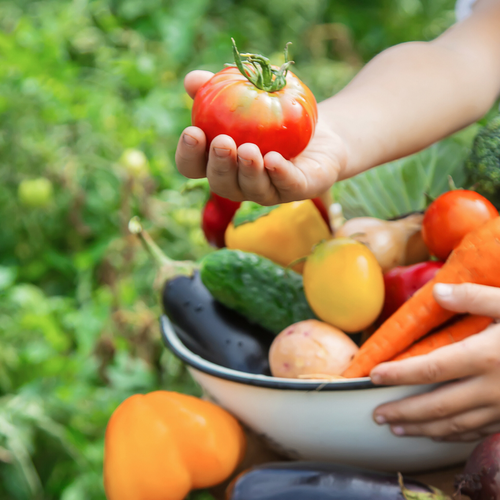With colds & flu doing their annual rounds and coronavirus disease (Covid-19) now added to the mix, boosting the immune health of your family has never been more important. Igennus Healthcare Nutrition brings you a great-tasting, convenient way to bolster the whole family, from children to grandparents. Combining excellently absorbed liposomal vitamin C with vital minerals, this is a supplement everyone will be happy to take!
Symptoms of a cold/’flu’/Covid-19 - how to tell the difference
Common colds typically involve a runny nose and sore throat with or without a headache, and you’re usually able to continue all your usual activities. Influenza is additionally accompanied by aching muscles and a fever, with or without a cough. It may force a retreat to bed or the sofa. Covid-19 symptoms can mimic both a cold and the ‘flu, but unique features are that it is often accompanied by a loss of taste and/or smell, digestive symptoms, a continuous cough with shortness of breath, and fatigue or ‘brain fog’(difficulty with memory or concentration) which can continue after the other symptoms have cleared up.
Immune System Boost
Though we’re blissfully unaware, the immune system is constantly waging war behind-the-scenes on viruses and bacteria that find their way into our bodies. Liposomal Vitamin C & Zinc Immune Support Complex combines extremely bioavailable, high-dose 1000mg vitamin C with the minerals zinc, selenium and copper, all known for improving resistance to infection.
Liposomal technology shields vitamin C from supplement to cell, delivering higher levels to the body. Coating vitamin C in a protective lipid layer, liposomes survive the harsh environment of the stomach. Structurally similar to our own cell membranes, liposomes fuse directly with the cells of the intestine to bypass restricted vitamin C uptake pathways. This enables more vitamin C to reach the blood where the lipid layer continues to protect the vitamin C from oxidation and excretion.
Well known as an antioxidant, vitamin C promotes immune function by boosting the ability of T-cells (natural ‘killer’cells –a type of white blood cell) to fight infection, supporting phagocytes - which literally gobble pathogens, along with encouraging the production of an array of immune chemicals used by the body to tackle invaders.
We use zinc and copper which is chelated with the amino acid glycine, both to increase absorption and because glycine supports white blood cell production and protects the body from oxidative damage during the immune response. (Zhong) While zinc and copper are both vital to immune cell development and function, taking a zinc-only supplement can upset the important zinc-copper ratio in the body, so we include both in an optimal ratio.
Many of us are low in selenium, and as a result are more vulnerable to respiratory infections. Selenium is an excellent antioxidant, promotes antibody production and boosts the killing capacity of many types of white blood cells.
Proven benefits of vitamin C and the immune ‘super-minerals’
Vitamin C may decrease both the severity and duration of colds. (Hemilä) Demonstrating the same benefits, zinc is especially effective when started within 24 hours of symptom onset. (Rao) When supplemented regularly, zinc reduces the incidence of common colds, school absenteeism and the prescription of antibiotics in children. (Singh) Lab studies have shown copper to have direct antiviral effects, including inhibiting the replication of the ‘fluvirus. Selenium deficiency is associated with increased severity and progression of viral infections. (Avery)
Convenient and free from ‘nasties’
Liposomal C & Zinc Immune Support Complex is easy to incorporate into your daily routine. It can either be taken daily as an immune defence, or started as soon as symptoms appear. At Igennus Healthcare Nutrition, we love the tangy citrus-vanilla emulsion straight from the spoon, but it can also be stirred into water, added to smoothies or used as a topping on breakfast or yoghurt. It’s free from sugar & sweeteners, artificial colours & flavours and does not contain soy, unlike many liposomal supplements.
With some children back at school and many back at work, it may seem like an impossible task protecting the whole family from illness. You may be even more concerned if you are in close contact with elderly or vulnerable family members.
Here are 5 tips to further support family immune health
1. Keep active
Studies show that moderate, regular exercise boosts immunity by increasing white blood cell activity, immune cell circulation, and promoting a healthy gut microbiome. (Ticinesi) Strenuous exercise, on the other hand, can actually decrease immunity, but fortunately vitamin C has been shown to prevent respiratory infections during and after intense exercise. (Hemilä) With gyms closures around the country, why not brave the cold and take your daily exercise outdoors. Contact with nature will help lower stress levels, with further positive effects on the immune system.
2. Replace refined sugar and alcohol
Did you know that sugar makes immune cells sluggish for a few hours, allowing microbes to gain the upper hand? It also causes inflammation and disrupts the gut microbiome, a vital part of our immune defence. (Myles) Likewise, alcohol increases the risk of respiratory tract infections. (Sarkar) Replace refined sugar with natural fruit this winter, which also provides the added benefit of vitamin C and other antioxidants. Swap alcohol for a steaming mug of herbal tea - there are so many delicious flavours to choose from.
3. Surrender to sleep
Long nights naturally promote earlier bedtimes and eliminate being woken too early by the light - a welcome advantage, as sufficient sleep is important for both adults and children to fight infection. According to a study, those who get less than seven hours sleep at night are almost three times as likely to get a cold, in comparison to those who get eight hours or more of rest. (Cohen) During sleep, your body produces chemicals which both help you fall and stay asleep and fight pathogens.
4. Immune-boosting smoothies and soups
Fruit & vegetables are naturally high in vitamins & minerals that are antioxidant and anti-inflammatory. Staying hydrated is also vital for the health of mucous membranes lining the respiratory tract. Fortunately, it’s easy to pack fruit, vegetables and water into smoothies and soups. Add fresh ginger, live yoghurt & mint to smoothies, and garlic, onion, tomato and herbs to soups for extra immune-boosting punch.
Recipe ideas: Look for soup recipes containing nutrient-rich sweet potato, garlic, ginger, onion, herbs, tomatoes and lentils. Why not try pumpkin soup, a tomato and lentil combination, or a flavoursome Thai-inspired tofu and vegetable soup?
5. Vitamins A & D
Vitamin A plays a crucial role in the formation of the membranes of the respiratory tract, as well as in the production of protective mucus. (Huang) Good sources of vitamin A include liver, sweet potato, carrots and oily fish. Vitamin D is important for many aspects of immune regulation - both preventing autoimmune illness and protecting against infection. (Aranow) It’s a wise move to take a vitamin D3 supplement from October to March, when a lack of sunshine prevents our bodies from making vitamin D. Alongside our Liposomal C & Zinc Immune Support Complex, we recommend Pure & Essential Daily D3 2000IU or Pure & Essential Vegan D3 1000IU. Vitamins A and D may assist zinc and selenium in providing resistance to Covid-19. (Jayawardena)
References
Ticinesi A, Lauretani F, Tana C, Nouvenne A, Ridolo E, Meschi T. Exercise and immune system as modulators of intestinal microbiome: implications for the gut-muscle axis hypothesis. Exerc Immunol Rev. 2019;25:84-95. PMID: 30753131.
Myles IA. Fast food fever: reviewing the impacts of the Western diet on immunity. Nutr J. 2014;13:61. Published 2014 Jun 17. doi:10.1186/1475-2891-13-61
Sarkar D, Jung MK, Wang HJ. Alcohol and the Immune System. Alcohol Res. 2015;37(2):153-155.
Cohen S, Doyle WJ, Alper CM, Janicki-Deverts D, Turner RB. Sleep Habits and Susceptibility to the Common Cold. Arch Intern Med. 2009;169(1):62–67. doi:10.1001/archinternmed.2008.505
Aranow C. Vitamin D and the immune system. J Investig Med. 2011;59(6):881-886. doi:10.2310/JIM.0b013e31821b8755
Huang Z, Liu Y, Qi G, Brand D, Zheng SG. Role of Vitamin A in the Immune System. J Clin Med. 2018;7(9):258. Published 2018 Sep 6. doi:10.3390/jcm7090258
Zhong Z1, et al. L-Glycine: a novel antiinflammatory, immunomodulatory, and cytoprotective agent. Curr Opin Clin Nutr Metab Care. 2003 Mar;6(2):229-40.
Rao G, Rowland K. PURLs: Zinc for the common cold--not if, but when. J Fam Pract. 2011;60(11):669-671.
Jayawardena R, Sooriyaarachchi P, Chourdakis M, Jeewandara C, Ranasinghe P. Enhancing immunity in viral infections, with special emphasis on COVID-19: A review. Diabetes Metab Syndr. 2020;14(4):367-382. doi:10.1016/j.dsx.2020.04.015
Singh M, Das RR: Zinc for the common cold. Cochrane Database Syst Rev 2011; 2: CD001364
Hemilä H., Chalker E. Vitamin C for preventing and treating the common cold. Cochrane Database Syst. Rev. 2013;1:CD000980. doi: 10.1002/14651858.CD000980.pub4.
Joseph C. Avery, Peter R. Hoffmann Selenium, Selenoproteins, and Immunity Nutrients. 2018 Sep; 10(9): 1203. https://www.ncbi.nlm.nih.gov/pmc/articles/PMC6163284/








